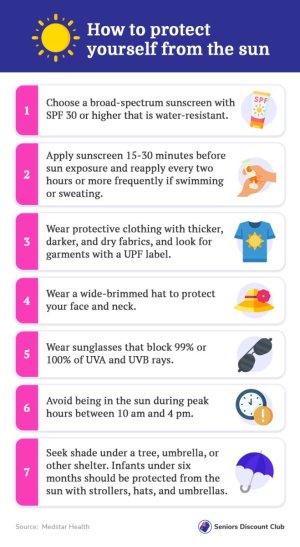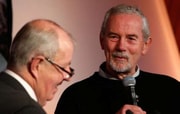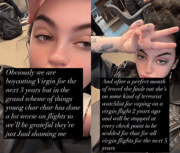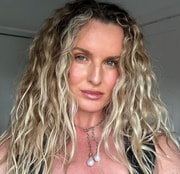Groundbreaking Skin Cancer Prevention Technology Unveiled by Australian Researchers - The Latest in Sun Safety Innovation
By
- Replies 1
As we move into autumn in Australia, the days are getting shorter, and the temperature is dropping. However, even as the weather cools down, there's no denying that Australians love spending time outside, soaking up the sun and enjoying all that the great outdoors has to offer.
For many Australians, spending time outside is a way of life. From hiking and camping, to surfing and swimming at the beach, Australians are known for their love of outdoor activities.
Even in the cooler months, many Australians continue to enjoy these activities, simply adjusting their routines to suit the changing weather.
However, due to the country’s proximity to the equator and the harsh Aussie climate, it's crucial to prioritise sun safety while spending time outdoors.
The sun's harmful UV rays can cause sunburn and increase the risk of skin cancer.
Hoping to address this problem, a team of researchers from the Queensland University of Technology (QUT) have created a revolutionary new way to protect against sunburn and reduce the risk of melanoma.

Introducing the sun-smart wristbands - a simple yet clever way to ensure we’re not spending too much time in the sun.
The clear band is filled with a dye that changes colour when it’s exposed to UV rays - the colour of the band will turn pink when the wearer has been exposed to too much sun and is starting to get a sunburn.
Not only that, but the band accumulates sun throughout the day rather than returning to clear when the user moves into the shade.
'It's really important to measure the cumulative dose because often people, throughout the day, during activities like going to the shops or commuting ... People don't usually think (how) about these exposures to sun can build up over time,' Levi Swann from QUT said.
The team is also in the process of personalising the bands for different skin tones - for example, for fairer or tanned skin, adding certain additives to the bands to slow the dye-changing process down.
The QUT team is now looking for industry partners to take the bands from the lab into the market.
The cost of skin cancer to Australians is already huge - sun protection is incredibly important, and the sun-smart wristbands could be the next big step in reducing the impact of skin cancer in this country.
Australia has one of the highest rates of skin cancer in the world, particularly amongst Australians of European descent who, as a group, are exposed to more UV radiation than any other population. Skin cancer, in particular, melanoma, is the most common form of cancer in the country.

The risk of developing skin cancer is highest in Queensland, which holds the title of Australia’s melanoma capital.
Despite this, sun protection and skin cancer education may not always be a priority for many Australians - especially in areas where UV exposure is not as severe. That’s why it’s important for everyone to understand the basics of sun safety for the sake of their health.
Education regarding sun safety – when to wear sunscreen and other protective clothing, understanding UV exposure levels, and knowing what to look for when checking for skin cancer – has the potential to help reduce the number of Australians suffering from skin cancer in the future.

Research into the best approaches to educating the public about skin cancer and sun safety is an important part of reducing the risk of skin cancer and improving the health outcomes of people in Australia.
Educational campaigns targeting specific demographics, incorporating different forms of media, and providing helpful resources can change attitudes and behaviours towards sun safety.
So, there you have it, folks! Hopefully, it will not take long before this new invention becomes available to the public.
What do you think of this new invention? Let us know in the comments below.
For many Australians, spending time outside is a way of life. From hiking and camping, to surfing and swimming at the beach, Australians are known for their love of outdoor activities.
Even in the cooler months, many Australians continue to enjoy these activities, simply adjusting their routines to suit the changing weather.
However, due to the country’s proximity to the equator and the harsh Aussie climate, it's crucial to prioritise sun safety while spending time outdoors.
The sun's harmful UV rays can cause sunburn and increase the risk of skin cancer.
Hoping to address this problem, a team of researchers from the Queensland University of Technology (QUT) have created a revolutionary new way to protect against sunburn and reduce the risk of melanoma.

Australians love spending time outdoors and enjoying the sun, so this new technology is a welcome relief for those who are at risk of developing skin cancer. Credit: Pexels/Pixabay.
Introducing the sun-smart wristbands - a simple yet clever way to ensure we’re not spending too much time in the sun.
The clear band is filled with a dye that changes colour when it’s exposed to UV rays - the colour of the band will turn pink when the wearer has been exposed to too much sun and is starting to get a sunburn.
Not only that, but the band accumulates sun throughout the day rather than returning to clear when the user moves into the shade.
'It's really important to measure the cumulative dose because often people, throughout the day, during activities like going to the shops or commuting ... People don't usually think (how) about these exposures to sun can build up over time,' Levi Swann from QUT said.
The team is also in the process of personalising the bands for different skin tones - for example, for fairer or tanned skin, adding certain additives to the bands to slow the dye-changing process down.
The QUT team is now looking for industry partners to take the bands from the lab into the market.
The cost of skin cancer to Australians is already huge - sun protection is incredibly important, and the sun-smart wristbands could be the next big step in reducing the impact of skin cancer in this country.
Australia has one of the highest rates of skin cancer in the world, particularly amongst Australians of European descent who, as a group, are exposed to more UV radiation than any other population. Skin cancer, in particular, melanoma, is the most common form of cancer in the country.
Key Takeaways
- Researchers from the Queensland University of Technology created sun-smart wristbands to help curb the high rates of skin cancer in the state.
- The clear band is filled with a dye that changes colour when exposed to UV rays, warning the user when they are developing a sunburn.
- The bands accumulate sun throughout the day and can be reset and reused.
- Researchers are also working on personalising the bands to be more sensitive to fairer and tanned skin tones.
The risk of developing skin cancer is highest in Queensland, which holds the title of Australia’s melanoma capital.
Despite this, sun protection and skin cancer education may not always be a priority for many Australians - especially in areas where UV exposure is not as severe. That’s why it’s important for everyone to understand the basics of sun safety for the sake of their health.
Education regarding sun safety – when to wear sunscreen and other protective clothing, understanding UV exposure levels, and knowing what to look for when checking for skin cancer – has the potential to help reduce the number of Australians suffering from skin cancer in the future.

An infographic summarising how you can protect yourself from the sun. Credit: Seniors Discount Club.
Research into the best approaches to educating the public about skin cancer and sun safety is an important part of reducing the risk of skin cancer and improving the health outcomes of people in Australia.
Educational campaigns targeting specific demographics, incorporating different forms of media, and providing helpful resources can change attitudes and behaviours towards sun safety.
So, there you have it, folks! Hopefully, it will not take long before this new invention becomes available to the public.
What do you think of this new invention? Let us know in the comments below.
Last edited by a moderator:







